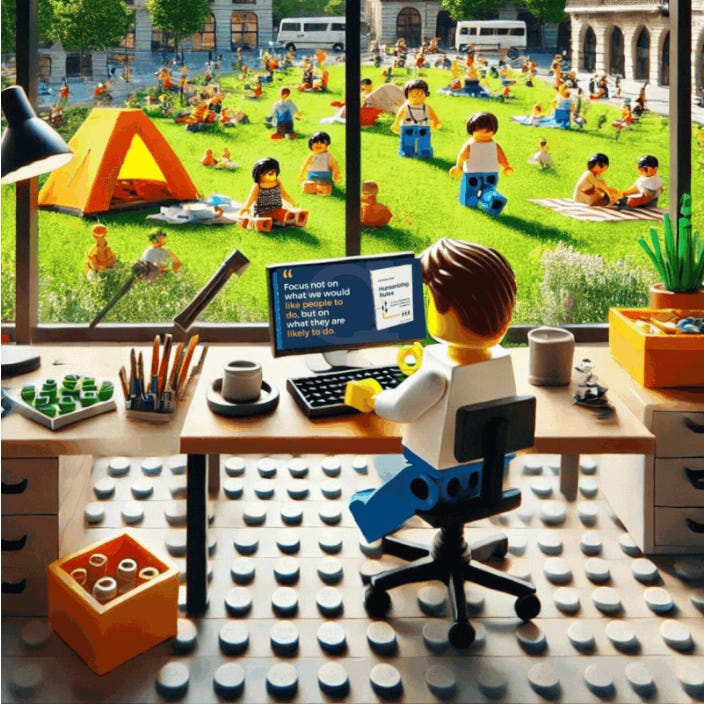NDAs are on their way out & how to get sh*t done and not sacrifice your wellbeing
Your monthly round-up of the best (and sometimes worst) of human risk.
Here in the Northern hemisphere, we’re deep into summer and that means one of two things: you’re either up against it with staff on leave OR you’ve finally got headspace to develop that project that’s been gathering dust. If it’s the former, then you might need to listen to my podcast guest Claus (read on). If it’s the latter, I have TWO new offers that might accelerate things in ways you never expected (scroll to the bottom - then read the rest of course).
1. NDAs can no longer buy silence: Zelda Perkins makes history
After an eight-year campaign, UK ministers have announced plans to stop bosses using NDAs to silence abused workers.
Having interviewed Zelda several times, I’ve seen firsthand how much of her heart and soul she’s poured into this campaign.
What she’s taken on — and what she’s achieved — can’t be overstated.
The Guardian’s headline says it all: “𝘛𝘩𝘦𝘳𝘦’𝘴 𝘯𝘰𝘸𝘩𝘦𝘳𝘦 𝘧𝘰𝘳 𝘵𝘩𝘦𝘮 𝘵𝘰 𝘩𝘪𝘥𝘦 𝘢𝘯𝘺 𝘮𝘰𝘳𝘦.”
This is what determined, principled action looks like.
And it's wonderful to see it succeed. But will other countries follow suit?
Find out more in this Guardian article.
2. Are you ok? Why workplace intelligence means addressing mental health in the workplace; for ourselves and for others.
Are you okay? Not the default '𝘧𝘪𝘯𝘦.;
Not the version we post on LinkedIn.
The real kind of okay.
Last week on the Human Risk podcast, I sat down with the co-authors of Wellbeing Intelligence: Better Mental Health at Work, Dr Kiran Bhatti and Professor Thomas Roulet, who’ve been thinking deeply about that feeling — and how we can respond to it better.
In a fascinating discussion, we explore:
➡️ Why mental health needs to be treated not just as an emergency response but as a proactive skillset;
➡️ Why high performers are often the most vulnerable;
➡️ Why mental health programs in companies can fall flat if they don’t feel human.
➡️ How physical symptoms can mask deeper emotional struggles;
➡️ The invisible tensions that can shape how teams feel and function.
Remember: You’re not alone. You don’t have to be perfect. And asking for help is a strength, not a weakness.
P.s. The (pictured) baby’s wellbeing was 10/10, so they had nothing to say on the matter.
3. What I learned from a crime tour in Munich
A few weeks ago, I joined a 𝘒𝘳𝘪𝘮𝘪𝘵𝘰𝘶𝘳 𝘥𝘶𝘳𝘤𝘩 𝘔𝘶̈𝘯𝘤𝘩𝘦𝘯: a three-hour tour of some of the city’s most famous crime scenes, led by a serving officer.
The 1972 Olympic Games terror attack.
A 2016 shopping mall shooter.
A bank robbery with hostage-taking.
High-profile murders.
I was expecting drama and a heavily curated narrative.
What I got was plain-speaking about parts of operations that didn’t go to plan; if indeed there were plans.
My top takeaways were:
If you don’t plan for it, don’t be surprised when it goes wrong.
At the 1972 Olympics, terrorists took Israeli athletes hostage. Despite similar incidents nearby in the months before, there was no plan for what to do if it happened during the Games. The result? Chaos and tragedy.Disrupt their plan — not just rely on yours.
In 2016, a gunman opened fire in a Munich shopping centre. He had a plan — but it started to fall apart due to the quick reactions of the police and even some members of the public. He lost control, and that saved lives.We’re all part of the safety team.
Lots of incidents are solved because regular people speak up or notice something odd. Of course, we can sometimes get in the way, too. But the message from the police was clear: they need us — to keep our eyes open, not to take charge.
And if you understand German, go on this tour.
4. Why is getting sh*t done so hard, and what can we do about it?
Getting sh*t done isn’t just about motivation or tools, it’s about design. Like my latest pod guest Claus Raasted explains.
Claus describes himself — with tongue firmly in cheek — as an overpaid rockstar consultant. But behind the flair is a deep understanding of how to:
✅ remove friction
✅ reframe work, and
✅ help people build systems that actually work for them.
In this episode, Claus and I talk about his Little Book of Getting Sh*t Done, why productivity isn’t about speed or optimisation, and how to shift from overthinking to action.
🚀 NEW OFFER: Want to pick my brains?
Got a dilemma that you’d like my thoughts on?
A sounding board for a madcap idea that needs a sense check?
New to the market (and perhaps for a limited time only) ,you can book a 30-minute meeting with me where you can pick my brains about whatever you want (literally).
Don’t miss: Road test my new content and grab a bargain
Yep, you read right. Groundbreaking (he hopes 😉) new material for a fraction of the price.
August is when my best content gets born. And this year, you can help shape it and get a great deal in the process.
Here’s the deal:
⚡ Only a few slots, and only this August.
✅ High-impact training using brand-new material
✅ Big discount + flexible timing
✅ I get your feedback. You get a bargain.
So if you’ve ever thought:
“𝘔𝘢𝘺𝘣𝘦 𝘸𝘦 𝘴𝘩𝘰𝘶𝘭𝘥 𝘣𝘳𝘪𝘯𝘨 𝘊𝘩𝘳𝘪𝘴𝘵𝘪𝘢𝘯 𝘪𝘯…”
Now’s your chance.
Don’t forget Compliance in the Wild never stops! Why not send me a baffling or brilliant example of something done well or (more likely) dreadfully badly? Drop me an email at christian@human-risk.com, and you might get a shout out on the CITW LinkedIn feed.
PS Want to learn more about how I can help you to mitigate human risk in your organisation? Then visit the Human Risk website.
PPS Subscribed in a previous life and no longer want to receive this? No hard feelings; you can unsubscribe using the link at the bottom.











